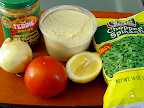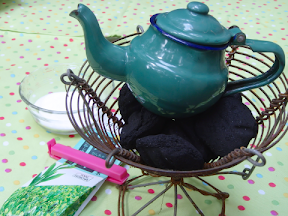Sunday, August 21, 2011
Niger - Fari Masa and Tuareg Tea
Background
Niger is the largest country in West Africa and takes its name from the Niger River running through its western region. Its population does not scale with its size because 80% of country is the Sahara Desert. Over half the population engages in agriculture, with the principal crops being millet, sorghum, and cassava.
(When searching for information on Niger it is important to get your adjective right or you find information about Nigeria. Things related to Niger are Nigerien and things from Nigeria are Nigerian.)
We are fortunate to have friends who spent a semester in Niger in college. Their recommendations included fari masa and an omelet sandwich, and they kindly offered to come to breakfast to demonstrate the preparation of traditional tuareg tea. We decided to try the fari masa, a leavened fried dough that is rolled in sugar or spices after frying. Lacking an authoritative recipe, we used a basic yeasted fried dough which met our friends' approval; those cooking at home can choose their own favorite.
Tuareg tea is made using green tea and has a strong social component attached to it. The tea is brewed three times, with the strength of the tea diminishing with each brewing. A saying about the tea goes "the first cup is bitter like death, the second is mild like life, and the third is sweet like love." The water is traditionally heated over coals in a wire brazier. We had the brazier but we could not get the coals lit so we used the stove instead.
Results and Discussion
Fried dough is good and hard to mess up. You get a nice brown crispy outside and a spongy warm inside. Rolling them in sugar helps too! A non-stick pan makes flipping and moving the dough much easier. The dough puffs up a great deal as you cook it and you should account for this when filling the pan. As I went along I discovered flouring my hands and spoon made dropping the dough into the oil safer.
The first brewing of the tea was frighteningly strong. I had a sip best measured in micro-liters and it hit me very hard. It is very bitter and the sugar did not lessen the bitterness. The second brewing was a bit more mellow but still very strong and bitter. (I liked it well enough –Kitty) The third brewing was finally something I would consider good. The other two brewing were just way too strong for me. The third brewing is given to children which adequately describes my caffeine tolerance.
Labels:
beverages,
sweet bread,
West Africa
Sunday, August 14, 2011
Burkina Faso - Lemon Porridge with Peanut Sauce
Background
Burkina Faso is a landlocked country in West Africa with a predominantly agricultural economy. According to the World Cookbook for Students, the major foodstuffs are maize, sorghum, and millet, with chilies and peppers used as condiments. Meals are eaten in the morning and upon returning from work. Three meals a day is more common for wealthier families.
For breakfast we chose millet porridge flavored with lemon juice, from the World Cookbook for Students. The lemon juice substitutes for fermenting the millet flour, a process we have done before for corn-based porridges. The porridge is then cooled, sliced and topped with a thick sauce made of spinach and peanut butter, from the Holidays of the World Cookbook for Students.
Millet is a form of grass but it does not fit nicely into a single scientific grouping. Rather it is a functional category of crops made up of small seeded grains which are usually grown in drought-prone areas.
Lemon Porridge
- 2 cups millet flour (may substitute fine white cornmeal)
- 4 cups cold water
- Juice of 1 lemon
- 1 cup water, for cooking

- Mix the flour into the cold water using a whisk.
- Add the lemon juice and let the batter stand for 15 minutes.
- Bring the other cup of water to a boil.
- Stir in the batter using a wooden spoon, continuing to stir the porridge until it is smooth, thick, and stiff.
- Pour the porridge into a greased mold or loaf pan and let it rest for 30 minutes.
Africans Greens in Peanut Sauce
- 1 tbsp vegetable oil
- 1 onion, finely chopped
- 1 green pepper, seeded and finely chopped
- 1 tomato, finely chopped
- 1 lb frozen spinach, thawed.
- ¼ cup peanut butter
- Salt and pepper to taste
- Heat oil in a saucepan over medium-high heat.
- Add peppers and onions, and cook until onions are soft.
- Add spinach and tomato, and cook until spinach is wilted (or heated through if frozen).
- Stir in peanut butter and serve.
Results and Discussion
The porridge had a strong lemon flavor. While fermenting gives a subtle sour taste that lingers in the background, the lemon juice brings the flavor to the front and dominates the dish. It is not necessarily a bad result, but it is a poor substitute for the flavor that comes form the fermentation process.
The peanut sauce had a nice flavor and its coarser texture goes well with the smoother porridge. The Holidays of the World Cookbook suggests serving it over rice which would make a nice lunch or dinner meal.
Labels:
cereal,
greens,
West Africa
Subscribe to:
Posts (Atom)


